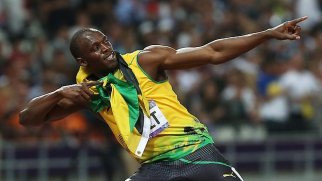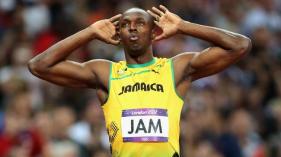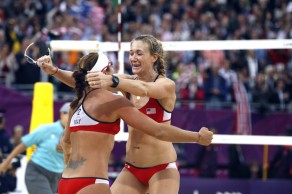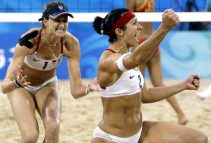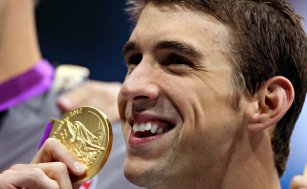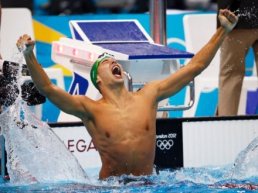There’s an old Jerry Seinfeld bit about the Olympics that sums up the last couple weeks pretty well. In it, he talks about how miniscule the difference between glory and devastation really is, often times no more than hundredths of a second.
“Did you forget to shave? Did you not hear the gun go off?” Seinfeld asks.
These small differences, though, are what define reputations—careers, even—for the rest of time.
One of comedy’s greats then concludes, “The difference between gold and silver: he’s the greatest guy in the world…that guy? Never heard of him.”
When London’s Olympics ended Sunday night, sports fans around the world felt satisfied but saddened, wishing the magic could’ve stayed for maybe a week more.
The Games of the XXX Olympiad came and went before we could even say, “Beckham,” and now we are left with so many incredible snapshots to consider.
Here is my rendition of London 2012’s ten greatest moments. There are too many honorable mentions to count, so let’s just say it’s all open to interpretation.
10. Poland’s Volleyball Fans Bring the House Down-
Olympic viewers tuning in to NBC in the early afternoon had to do a double take to make sure that they weren’t watching a Manchester United English Premier League game. The Polish faithful that came to root on their own men’s volleyball team truly embodied what the Olympics are all about—going absolutely batty for the athletes, even if they get trounced by Russia 3-0 in the quarterfinals.
9. Swimming’s Young Women Shine-
Coming into the Olympics with an incredible amount of pressure after being dubbed as “the Next Michael Phelps,” 17 year-old Missy Franklin delivered in a big way, returning to Colorado a four-time gold medalist. Distance freestyle specialist Allison Schmitt takes home five medals (3 gold) and 15 year-old Ruta Meilutyte of Lithuania started her Olympic career off with a bang, winning the 100-meter breaststroke over favorite Rebecca Soni.
8. Bahamas Dethrones U.S. in Men’s 4X400 Meter Relay-
Winning the nation’s second ever gold medal, the Bahamas took down a US team—albeit injury plagued—that had dominated this event for 28 years. The Bahamas tends to treat its Olympic heroes well—the nation’s largest airport is filled with murals and pictures of “the Golden Girls,” the 4X100 meter relay gold winners from 2000.
7. Mexico Wins Gold-
Mexico has had its strong soccer teams over the years, but has never been able to come away with an Olympic medal in ten appearances. This time, striker Peralta Morones put things way early and Mexico rode to a 2-1 victory over gold medal favorite Brazil. The country’s sole gold medal has caused a frenzy and these scrappy young men are now being considered national heroes. Pretty cool for a team that wasn’t really in the conversation at the start of the Games.
6. American Women Capture 4X100 Meter Gold-
Ending a 16-year gold medal drought, Tianna Madison, Bianca Knight, Allyson Felix and Carmelita Jeter set the track on fire, defeating the highly touted Jamaican team in a world record time of 40.82 seconds. This was truly one of the most joyous moments from the viewer’s perspective—as Jeter crossed the finish line, she saw the words “New W.R.” on the scoreboard and started pointing and screaming at the top of her lungs. Then, in what was London’s purest and most candid interview, she boasted to sideline reporter Lewis Johnson, “Everybody said we weren’t going to do it, but we did it!”
5. Andy Murray Redeems Himself-
Just a few weeks after losing a hard-fought match to Roger Federer in a Wimbledon final, Great Britain’s own Murray used a raucous (as much as is possible in tennis) crowd to his advantage to claim his first Olympic gold on the same All England Club court, over the same Roger Federer, 6-2, 6-1, 6-4. The best part for Murray, aside from being able to wear white at the All England Club for the first time, is that this win will build his confidence for coming grand slam events.
4. Jamaica Dominates Sprints, Bolt Reclaims Throne-
After all the speculation (including my own) that the world’s fastest man had slipped, Bolt emphatically showed us all we were wrong, dominating the 100-meter dash, 200-meter dash and anchor leg of a world record 4X100 meter relay win. Teammates Yohan “the Beast” Blake and Warren Weir made it a clean sweep at 200 meters. I guess the line about, “No competition left in the world” was a bit prophetic—must be time to buy Gatorade chews, everyone.
3. Jessica Ennis, Mo Farah Deliver-
Imagine letting your enthusiastic, loyal home country fans down. These two track and field athletes did and decided winning was the easier option. Ennis, whose face was featured in bus stop posters around London, kicked off Great Britain’s high-energy track and field program with a gold in the heptathlon. Alberto Salazar product Mohamed “Mo” Farah went for double (and his competitors, nothing) with wins at both 5,000 and 10,000 meters. It’s no wonder Mohamed was once again named the most popular male baby name in Great Britain.
2. Michael Phelps Becomes the Most Decorated Olympian of All-Time-
We had our doubts initially, but the Baltimore Bullet pulled through, earning two individual and two relay gold medals, as well as two silvers, to finish things up with 22 career Olympic medals, passing gymnast Larisa Latynina for the most all-time. After conquering the pool, Phelps will now try to tame the links with famous swing coach Hank Haney.
1. Saudi Arabia is Completely Represented for the First Time-
With the Middle-Eastern country scheduled to face eventual sanctions without female representation, the Saudi IOC finally relented, allowing 800-meter runner Sarah Attar and judo competitor Wojdan Shaherkani to compete. Make no mistake—the country is a long way away from any sort of parity. The media, the government and the entire Saudi population left much to be desired from a respect standpoint, but this story is just one snapshot of an Olympics in which many female athletes dominated, ascended to stardom and made their nations proud. Quite the fitting, long-awaited and long-deserved result just over 40 years after the passage of Title IX.




